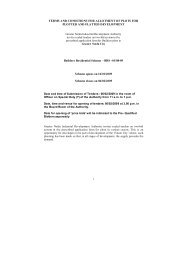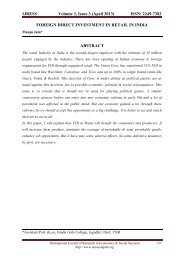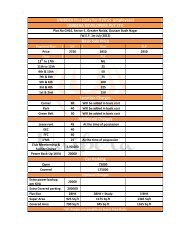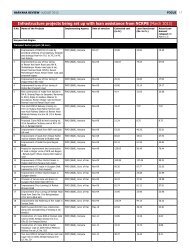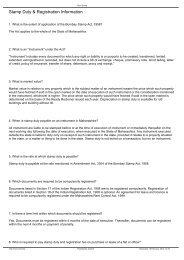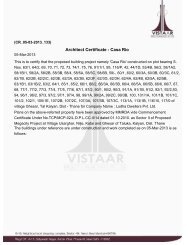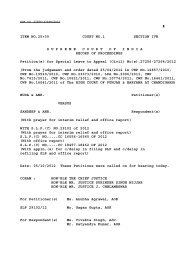eLegalix - Allahabad High Court Judgment Information System ...
eLegalix - Allahabad High Court Judgment Information System ...
eLegalix - Allahabad High Court Judgment Information System ...
You also want an ePaper? Increase the reach of your titles
YUMPU automatically turns print PDFs into web optimized ePapers that Google loves.
JUDGMENT/ORDER IN - WRIT - C No. 37443 of 2011 at <strong>Allahabad</strong> Dated-21.10....http://elegalix.allahabadhighcourt.in/elegalix/WebShow<strong>Judgment</strong>.doPage 178 of 19710/21/2011Government wrongly exercised its power under Section 17(4) in dispensing with the inquiry. The Apex <strong>Court</strong> afterconsidering all relevant cases has come to the conclusion that the dispensation of inquiry under Section 5A wasunsustainable. The Apex <strong>Court</strong> after taking the view that notification in so far as the dispensation of inquiry underSection 5A, was unsustainable, proceeded to consider as to whether at that distance of time acquisitionproceedings may be declared invalid and illegal. The Apex <strong>Court</strong> noted the submission of the GorakhpurDevelopment Authrority which had invested huge amount in the Development. The <strong>Court</strong> did not grant relief to thepetitioners for quashing the acquisition/notification. Following was laid down in paragraphs 55 and 56 which arequoted below:-"55.In the facts and circumstances of the present case, therefore, the Government has completely failed to justifythe dispensation of an enquiry under Section 5A by invoking Section 17(4). For this reason, the impugnednotifications to the extent they state that Section 5A shall not apply suffer from legal infirmity. The question, then,arises whether at this distance of time, the acquisition proceedings must be declared invalid and illegal.56. In the written submissions of the GDA, it is stated that subsequent to the declaration made under Section 6 ofthe Act in the month of December, 2004, award has been made and out of the 400 land owners more than 370have already received compensation. It is also stated that out of the total cost of Rs. 8,85,14,000/- fordevelopment of the acquired land, an amount of Rs. 5,28,00,000/- has already been spent by the GDA and morethan 60% of work has been completed. It, thus, seems that barring the appellants and few others all other tenureholders/land owners have accepted the `takings' of their land. It is too late in the day to undo what has alreadybeen done. We are of the opinion, therefore, that in the peculiar facts and circumstances of the case, theappellants are not entitled to any relief although dispensation of enquiry under Section 5A was not justified."Another recent judgment relied on by the learned counsel for the respondents is Shankara Cooperative HousingSociety Ltd. Vs. M. Prabhakar & Ors, (2011) 5 SCC 607. The Apex <strong>Court</strong> in the said case laid down principles forgranting or refusing relief on the ground of delay and laches. Following was laid down in paragraphs 54 and 68which are quoted below:"54. The relevant considerations, in determining whether delay or laches should be put against a person whoapproaches the writ court under Article 226 of the Constitution is now well settled. They are:(1)There is no inviolable rule of law that whenever there is a delay, the court must necessarily refuse to entertainthe petition; it is a rule of practice based on sound and proper exercise of discretion, and each case must be dealtwith on its own facts.(2)The principle on which the court refuses relief on the ground of laches or delay is that the rights accrued toothers by the delay in filing the petition should not be disturbed, unless there is a reasonable explanation for thedelay, because court should not harm innocent parties if their rights had emerged by the delay on the part of thepetitioners.(3)The satisfactory way of explaining delay in making an application under Article 226 is for the petitioner to showthat he had been seeking relief elsewhere in a manner provided by law. If he runs after a remedy not provided inthe Statute or the statutory rules, it is not desirable for the <strong>High</strong> <strong>Court</strong> to condone the delay. It is immaterial whatthe petitioner chooses to believe in regard to the remedy.(4)No hard and fast rule, can be laid down in this regard. Every case shall have to be decided on its own facts.(5)That representations would not be adequate explanation to take care of the delay.68. The other factor the <strong>High</strong> <strong>Court</strong> should have taken into consideration that during the period of delay, interesthas accrued in favour of the third party and the condonatoin of unexplained delay would affect the rights of thirdparties. We are also of the view that reliance placed by Shri Ranjit Kumar on certain observations made by this<strong>Court</strong> would not assist him in the facts and circumstances of this case. While concluding on this issue, it would beuseful to refer the observations made by the <strong>Court</strong> in the case of Municipal Council, Ahmednagar Vs. Shah HyderBeig, wherein it is stated that:`delay defeats equity and that the discretionary relief of condonation can be had, provided one has not given byhis conduct, given a go by to his rights'."From the dictum of the Apex <strong>Court</strong> as noted above, it is clear that the creation of third party rights and carrying ondevelopmental works on the allotted sites has bearing while considering the issue as to what relief the landowners who have challenged the acquisition proceedings are entitled.





